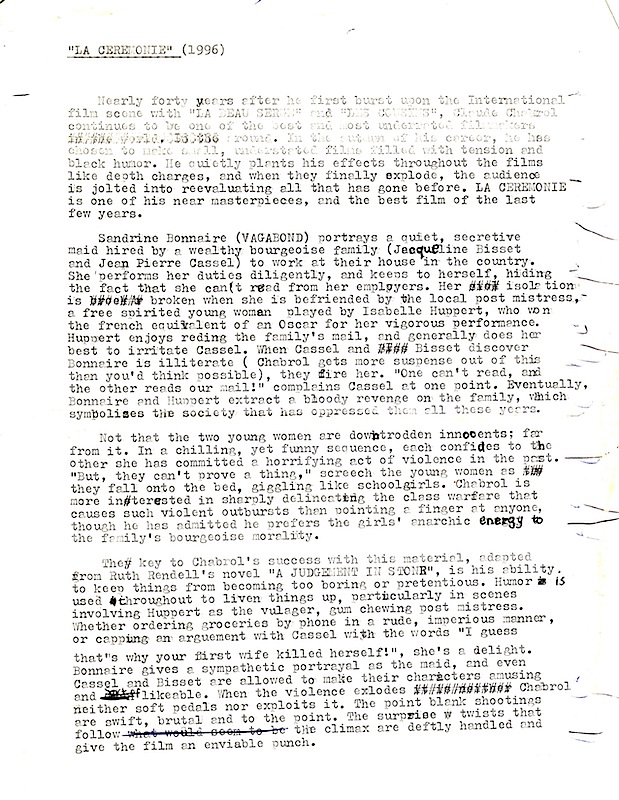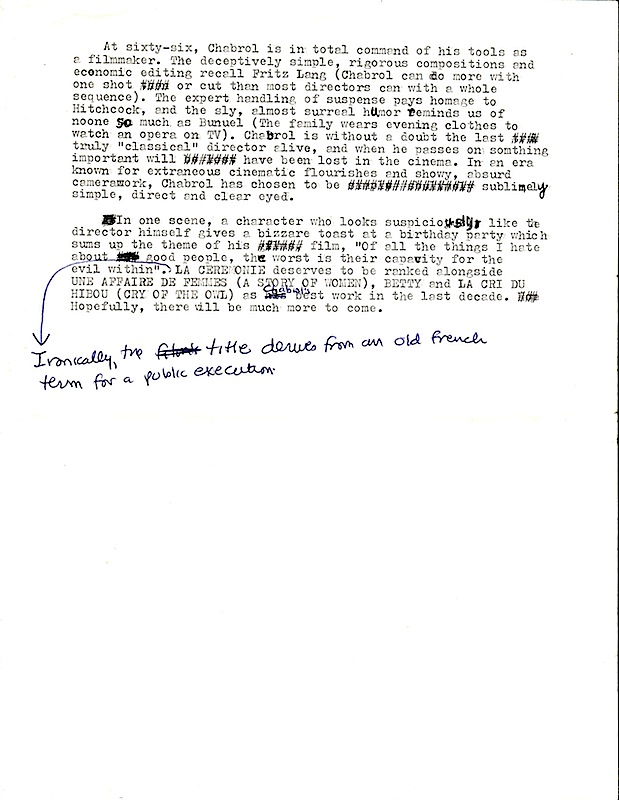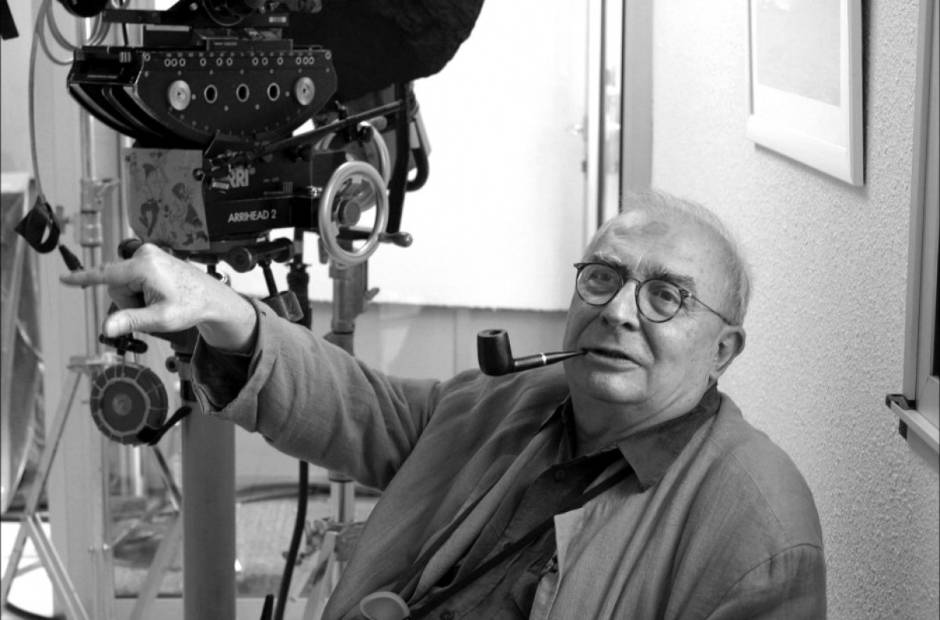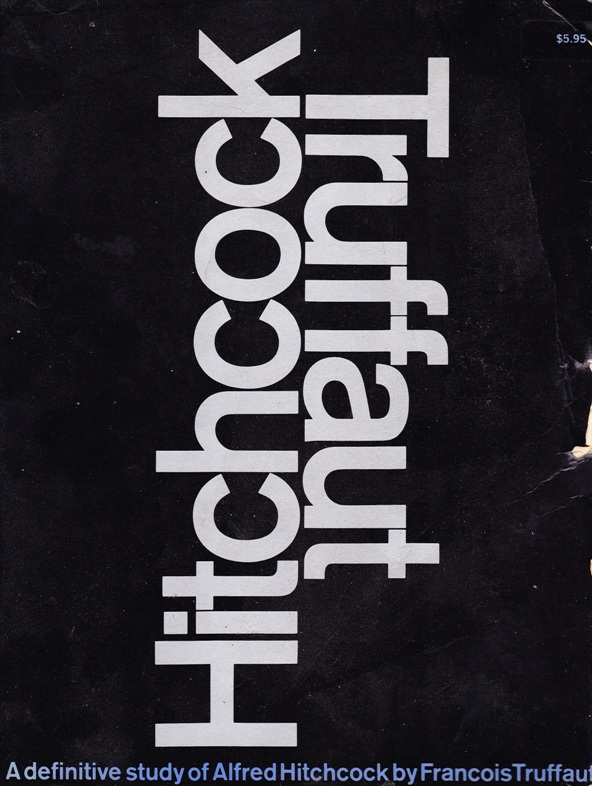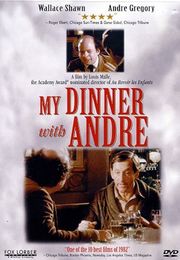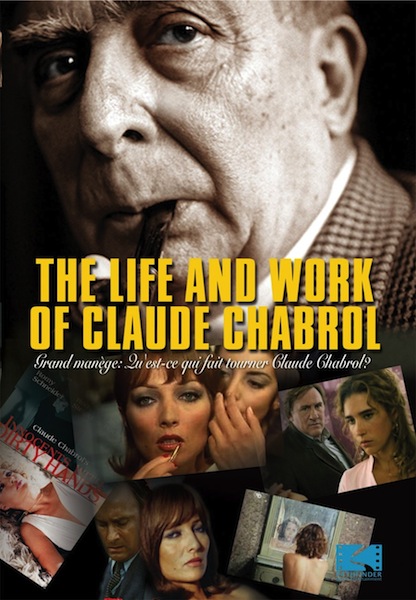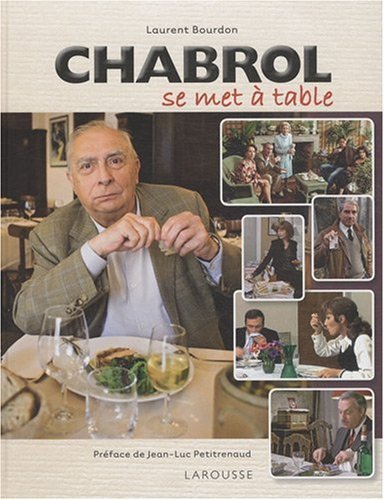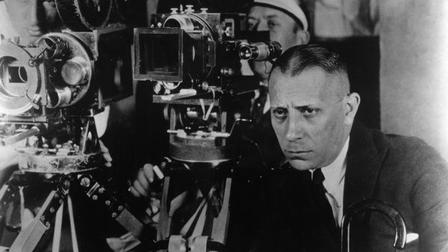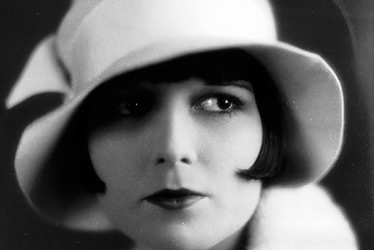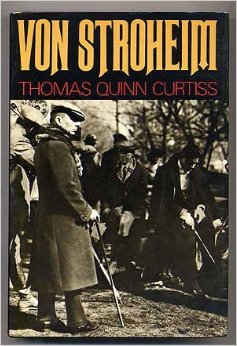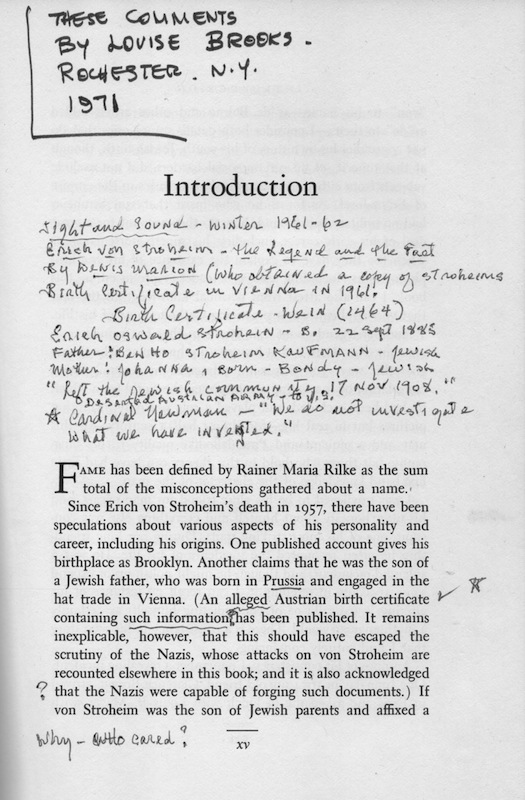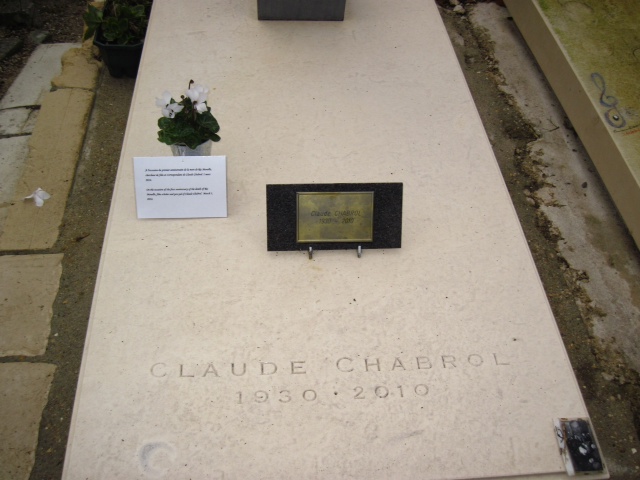by
Vincent Giordano
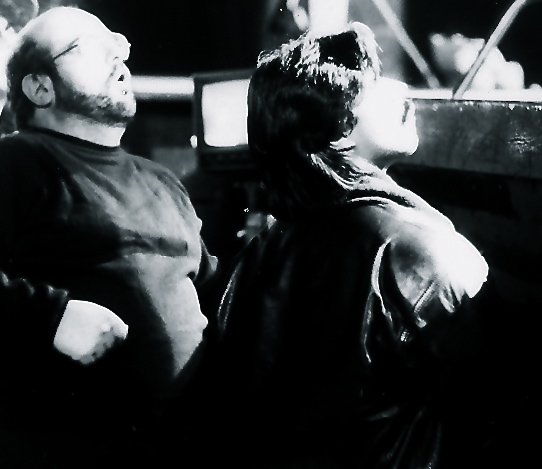 “Life is a combination of magic and pasta.”
“Life is a combination of magic and pasta.”
― Federico Fellini
Mr. Ric’s Cinema evolution began when my friend screenwriter and TV producer/writer Will Rokos asked if I had any television show ideas in development. I never really had ventured into television writing but I did have several interesting ideas that were perfect if developed correctly. Will helped me shape several ideas into workable concepts. One idea was about a bright young dreamer who desperately wants to create a Cinematheque in New York as a place where “people come as they are and then leave different,” a phrase that defined the work of the late Henri Langlois and his influential Cinematheque Francais. It would essentially be a story of a man struggling to achieve his dream but set in a world of magical realism where the possibly ghosts and spirits of famous actors and directors could glide through the narrative at any moment and become integral parts of an episode.
It was always called Mr. Ric’s Cinema, though most of the personal details were drawn from my own life. Mr. Ric was an affectionate name given to my cousin, Ric Menello, during his midnight shift years at Weinstein Hall, by the students who spent endless hours talking film with him each night. I wanted the character to be a larger than life person much like my cousin with an astounding scope of film knowledge. When I asked Ric to work on the pilot he immediately responded negatively not only to concept but to the use of his nickname in the title. I told him I would shift the character from an Orson Welles type like Ric to a more passionate graduate student closer to John Cassavetes crossed with kinetic energy of Quentin Tarantino. I was going to use my own life especially my younger years making films with my high school friends and just fill it in with Ric’s own experiences or the ones he wanted to offer within the context of the series. He seemed more at ease with that approach but doubted we could come up with a pilot that would reverberate with a larger audience for television.
The idea of each episode was to use the energy and enthusiasm of the writer or writers to focus on the films, filmmakers or actors living or dead for whom they had a passion. Thus, it was more a labor of love than a writing assignment. This would give the series not only unique energy but also a vibrant spirit often missing from the grinding gears of weekly television series.
The first problem was how to craft a pilot that could demonstrate the potential of the series in a unique and creative way. The isolated scope of cinephiles and cineastes is often so focused on their passion for movies that the outside world often simply melts away. We needed to create characters that were unique and varied but true to their world.
It took a long time to come up with a plot and a filmmaker to focus on. I found a story one day in the newspaper about the great-niece of famed French author Georges Simenon, who created the fictional detective Jules Maigret, who was charged in a murder labeled “a perfect crime gone awry.” We were thinking all along of focusing on French filmmaker Claude Chabrol because of Ric’s in-depth knowledge of his work. Ric had been personally corresponding with Chabrol for years but had never met him. Chabrol even sent him, at one point, his personal autographed script to L’Enfer. Ric had also contributed commentary to the DVD releases of two Chabrol films and had written numerous reviews of his films, some of which were published and some of which were not.
The idea of a murder in Mr. Ric’s apartment building and the arrival of Chabrol at a key moment dove tails into what was to become our first pilot, A Delicious Murder. The plot would correspond with Chabrol’s own mindset at the time, “Certainly I’m happy right now making these films about murder. My interest isn’t in solving puzzles, but in studying human behavior. Nothing else interests me so much. I’m not a chansonnier, a man obsessed with the events of the day…”
Chabrol was a known gourmet chef and shot his 1971 film 10 Days Wonder in Alsace, a small metropolitan region in France, only because he wanted to visit the many excellent restaurants there. So our pilot would feature two things important to Ric’s and Chabrol’s heart, and that was film and food.
Chabrol was also a major figure in the novella vague or French New Wave and a critic for the Cashiers du cinema before beginning his career as a filmmaker much like his contemporaries Jean-Luc Godard, Francois Truffaut, and Eric Rohmer. This gave us a nice echo back to the Cinematheque Francais and the passion of that time.
The pilot was funny and fast paced, and introduced all the elements and characters that could effectively grow through the seasons to follow. It was a great introduction to Mr. Ric’s world.
An agent responded positively to the pilot and wanted another accomplished writer to rewrite the pilot. Ric balked; he wanted to wait for Chabrol’s response, though we accepted the notes on specific changes.
The time was ticking away while Ric was waiting to get Chabrol’s email from a director friend who promised it to him so they could reconnect. In the meantime, we worked on another polish and further refined the pacing of the pilot.
We wanted Chabrol to act in and direct the pilot. But our real idea was to take it to another level and create a documentary film that would be like the book Truffaut/Hitchcock combined with the documentary My Dinner with Andre. In the documentary, Ric and Chabrol would move throughout France having meals and discussing Chabrol’s career in detail. We would then turn their extensive dialogue into a book like Truffaut/Hitchcock. If it turned out well, it would be a stand along project or if the series went ahead, it could be part of the actual narrative with the fictional Mr. Ric put in the place of Ric for use within the context of the series. Our elaborate plan also featured an extensive website in which Ric would offer in depth notes and anecdotes on each film and filmmaker that each episode focused on. His cinematic partner in crime, Mel Neuhaus, would aid him in that part and both would craft something unique for the web along with short video episodes, which would extend the series through their scrupulous and often funny explanations and analyses.
Chabrol had done a previous documentary talking with various people from his life over meals as well as the cookbook and film book “Chabrol Se Met a Table” (“Chabrol Sits Down to Eat”). Chabrol himself was an enormously entertaining man and when matched with Ric would have produced a unique document.
Things were moving positively along until the terrible news that Chabrol had suddenly passed away. We were so close and I didn’t even have the heart to tell Ric that I made contact with Chabrol and was in the process of sending the pilot to him. It effectively killed off our elaborate plan. Dead in the water, we had to figure out whether to let it die or move on.
I had completed two more episodes The Great Von and Herr Lang’s Monkey and felt The Great Von could be the replacement pilot. Ric and I had also sketched out yet another episode called Little Mizoguchi, so we had material to move on and many new ideas to explore.
The Great Von came from my extensive research into the life and career of the late colorful director Erich Von Stroheim and an odd scribbled-in biography that I happened to buy online. I would often borrow prints of Von Stroheim’s films from the late film historian/professor William K. Everson who loved my cousin Ric. Everson was a staple of New York film schools and taught film history to many people in the industry; and he was a character in his own right. He taught both Ric and me at different intervals of his teaching career. In his honor, we created a recurring character like him in the pilot.
I went through a period when I tried to buy every book I could find on Von Stroheim including his published novels. Some books at the time were hard to find and quite expensive. I found a used copy of Von Stroheim by Thomas Quinn Curtiss while working in the studio with Metallica in San Francisco. I had them send the book to the studio so I could read it in my downtime. Though not the most accurate or well-researched books on Von Stroheim it was the one missing from my library at the time.
The book arrived quickly at the studio but when I opened the package and began reading the book it was, totally to my dismay, marked with notes throughout. I hate it when I get books with other people’s scribbling in it. It is so distracting to me. I had to call Ric up and complain. True to his nature, he asked who wrote the notes. I was like who cares I’m returning the book. He said, “Read the book and check the notes to see if there is anything interesting there, because if it is that intensely notated, someone took the time to mark it that way for a reason.”
I calmed down and began analyzing the notes. They were correcting the numerous errors in the book. The corrections all seemed accurate and extremely detailed.
I went back to the front of the book finally finding the notation, “These comments by Louise Brooks. Rochester, NY 1971.” I was stunned. I had actually talked to Louise in the early 80s when I was doing my American Film Institute film. I wanted her to star in it as the elderly woman who was displaced after a tragic mugging in her building. I had no chance of convincing her to be in the film but our conversations were certainly memorable. She humored me and told me I was..”tragically optimistic.” Louise was extremely well read and an intelligent soul. She was also a fiercely independent woman who lived life her way after bursting onto the screen as the star of two classic silent films by director G. W. Pabst. Louise managed to publish her memoir just after I had spoken to her then she died three years later in 1985. But I felt it was certainly fate that the two widely disparate subjects were joined in this book. It was pure magic – the magic I was looking for in the new pilot.
I created a composite character based on several people, which resulted in a unique, full-bodied individual that drew inspiration from many sources. The new character would be this once vibrant actress now entombed in her mansion living in an alcohol-induced haze. Von Stroheim represented to me the heartbreaking crushed aspirations of someone who creatively could never climb back to his once coveted director role.
The new pilot was far different from our original approach and included elements that really seemed to work. The opening roundtable where our main characters converge to bullshit about life and movies didn’t have to be a recurring theme and could be used as needed. The second episode, Herr Lang’s Monkey, gave us a further understanding of Mr. Ric himself, his home life and how he really came to organize his theater.
With the new pieces in place, we have begun to move the project again. If it fails to go, I hope one day to make one of the episodes into a short film as a tribute to Ric. The soul and spirit of what the series is, embodies the love Ric had for film.
There is another odd twist between how the elements of the project somehow keep circling back. On March 1st, 2014, the one year anniversary of Ric’s passing, Ric’s close friend Brad went to France and put a note on Chabrol’s grave thus finally joining them together, though I am sure by now Chabrol and Ric are eating their hearts out talking movies all day long.
Today, on this heartbreaking anniversary, I am in Paris. I have visited Père Lachaise cemetery, Division 10, to find the grave of Claude Chabrol. I put flowers on it, plus a card with this inscription:
A l’occasion du premier anniversaire de la mort de Ric Menello, chercheur de film et Correspondant de Claude Chabrol. 1 mars 2014
On the occasion of the first anniversary of the death of Ric Menello, film scholar and pen pal of Claude Chabrol. March 1, 2014
I don’t think M. Chabrol would mind…
Brad
In Memory of
Claude Chabrol
(1930-2010)
©2014 Vincent Giordano. Unauthorized use and/or duplication of this material without express and written permission from the author is strictly prohibited.

